Just In
- 4 min ago

- 40 min ago

- 1 hr ago

- 5 hrs ago

Don't Miss
- Sports
 IPL 2024: Noise Levels Peaked When MS Dhoni Hit Last-Ball 4 in CSK vs LSG Match
IPL 2024: Noise Levels Peaked When MS Dhoni Hit Last-Ball 4 in CSK vs LSG Match - News
 Odisha Elections 2024: Naveen Patnaik Roots 'Double Conch' Against BJP's 'Double Engine' Campaign
Odisha Elections 2024: Naveen Patnaik Roots 'Double Conch' Against BJP's 'Double Engine' Campaign - Automobiles
 Kia Carens Earns Mixed Safety Ratings Amidst Growing Popularity In India
Kia Carens Earns Mixed Safety Ratings Amidst Growing Popularity In India - Finance
 Okay Play India Posts 12.79% Revenue Growth In Q4 After 1:10 Stock Split Approval
Okay Play India Posts 12.79% Revenue Growth In Q4 After 1:10 Stock Split Approval - Education
 Karnataka SSLC Class 10 Result, Tentative Date, How and Where to Check KSEAB Result 2024
Karnataka SSLC Class 10 Result, Tentative Date, How and Where to Check KSEAB Result 2024 - Travel
 Fly in Luxury: 10 Ways to Get Free Flight Upgrades
Fly in Luxury: 10 Ways to Get Free Flight Upgrades - Movies
 Arti Singh Mehndi Ceremony: Bride-To-Be Stuns In THIS Unconventional Pre-Wedding Outfit, Inside PICS Revealed
Arti Singh Mehndi Ceremony: Bride-To-Be Stuns In THIS Unconventional Pre-Wedding Outfit, Inside PICS Revealed - Technology
 Realme Narzo 70 & Narzo 70x Launching Today in India: Check Price, Specs, Live Stream Details
Realme Narzo 70 & Narzo 70x Launching Today in India: Check Price, Specs, Live Stream Details
12 Similarities between Hindu and Greek Mythology That Will Take You By Surprise
Mythology is the cradle of any civilisation that it is a part of, and represents the cultural moorings and traditional hallmarks of the tribe that was born in it. Almost all mythologies around the world have similar characters, from the category of celestials.

India and Greece are widely known for their rich civilizational and mythological backgrounds that are mostly similar with respect to the mythical characters that figure in their descriptions. Both Hellenic or Greek and Indian mythologies are the oldest known set of ancient evidence that are interconnected with each other in essence, with marked similarities. Let us see how Zeus or Dionysus of Greek Mythology compares with Indra or Shiva of Indian or Hindu Mythology and so on.
Hindu And Greek Mythology: Similarity Of Background
As per the research studies on ancient scriptures and the history of both civilisations, the Greeks and Sanatana dharma have an inseparable connection through their myths that dates back a very long time in history. Mention of Greeks is found in the Vedic Literature, Puranas, Tamil Sangam Literature and Tamil Epics as per which, Greeks have also been known to be co-dwelling with the Vedic Hindus from times of yore. The word "Yavana" that is used to distinguish the Greeks the mainstream Vedic Hindus has a distinct background that originates from the Bharath of Ancient times. As per the findings, the Greeks participated in the Kurukshetra War along with Duryodhana after consulting Karna. India and Greece's trade relationship and route is as old as 300 BC.
The Yavanas (in Indian literature) or Greeks, were treated as a part of Mlechcha, a name given to those who had deviated from the mainstream culture of Vedic Dharma. Therefore, there is a strong belief that everybody, including Greeks were following Sanatana Dharma. Greeks had a caste system ingrained in their culture that closely resembled Hinduism wherein most of them were found to be Kshatriyas or Vaishyas. A part of the epics says that Yavanas were the descendants of Turvasu, one of the cursed sons of King Yayati who had cursed his four sons except for the fifth son Puru whom he considered eligible for kingship so that his lineage could continue. Pauravas or sons of Puru ruled the Yayatis empire from the plains of the Ganges, and later created the Kuru and Panchala kingdoms. They followed the Vedic culture thoroughly.
Yavanas who were Kshatriyas, later on, by giving up the brahminical culture, became mleccha-yavanas. Mahabharata carries the descriptions for the Yavana clan in its Adi Parva 85.34. Turvasu's country was conquered by Sahadeva, the Pandava prince. So, the Yavana joined hands with Duryodhana and fought for the Kauravas upon the request of Karna. In Srimad Bhagavatam 2.4.18 it is predicted that the Yavanas would invade India one day in the Kaliyuga. The prediction was proved true in 326 BC.

1. Similarities between Sharvara and Cerberus
Sharvara is a famous mythical hound from hell whose owner is Lord Yama. The Greek counterpart to this is the Cerberus that accompanied Hades, both of which guard the gates of the netherworld.
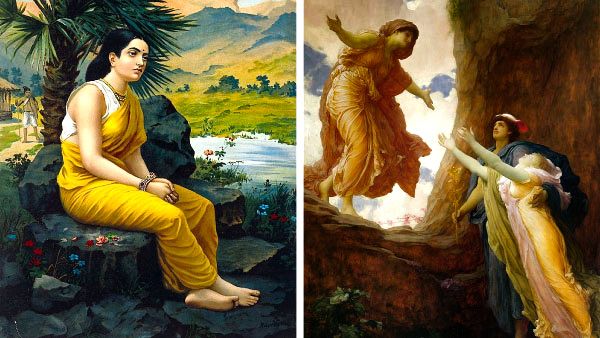
2. Similarities between Sita and Persephone
While Sita was abducted by Ravana, Persephone was carried away by Hades. It was carried out against their will. They also merge into mother earth under different contexts.

3. Similarities between Kamadeva and Cupid
Kamadeva and Cupid are known by different names but they function in the same way. Both shoot arrows into the hearts of people to make them fall in love.

4. Similarities between Mount Kailasha and Mount Olympus
While Olympus is the mountain that is a celestial abode for 12 Greek gods, Kailasha, the home of Shiva, is extolled as a primordial pillar that the world is based on. Both exist even in today's times.
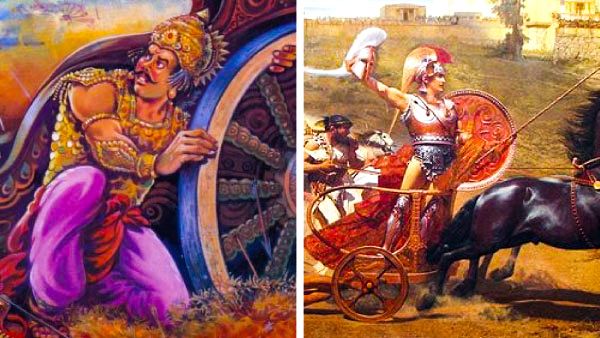
5. Similarities between Karna and Achilles
Zeus and Indra, the most skilled warriors of their times, are strikingly similar with respect to their impenetrable armour that made them indomitable. Both were demigods and were requested by their mothers not to participate in the ensuing war. With the death of these two warriors the great war saw an end.
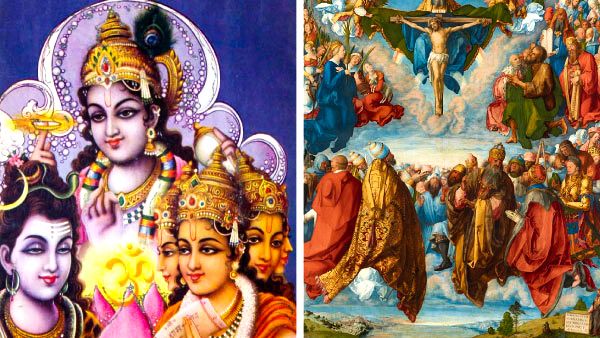
6. Similarities in the concept of Holy Trinity
The concept of the Holy trinity is the same to both traditions. We have Gods, Brahma, Vishnu, and Maheshwar who are a part of the holy trinity, Similarly Greek mythology has Zeus, Hades, and Poseidon who respectively rule the heavens, whereas the underworld rules the seas.
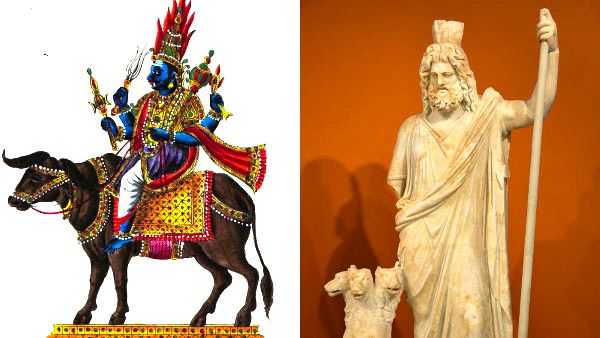
7. Similarities between Yama and Hades
Hades and Yama, although are lords of the netherworld, are not seen as evil Gods. Their job is to just assign a person based on his accumulated virtues or vices, his place in heaven or hell.

8. Similarities between Saptarishis and Seven Sisters
Saptarshis are the seven Rishis who accompany God in the great deluge and its aftermath. They are capable of stopping Lord Sun in his tracks. Greek mythology talks about seven sisters namely Pleiades who are also a cluster of stars just like the Saptarishis.
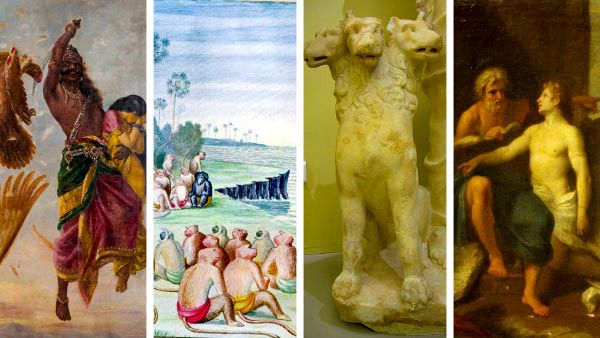
9. Similarities Between Jatayu And Sampati , Icarus And Daedalus
The Icarus and Daedalus story finds a parallel in Indian Mythology that describes the story of Jatayu and Sampati. Once upon a time, when they both flew in the sky, Jatayu, got close to the sun, to protect whom, sampati covered Jatayu with his wings, but his wings, due to getting close to the Sun, were burnt and he fell on to the ground. Greek God Icarus has a similar story.
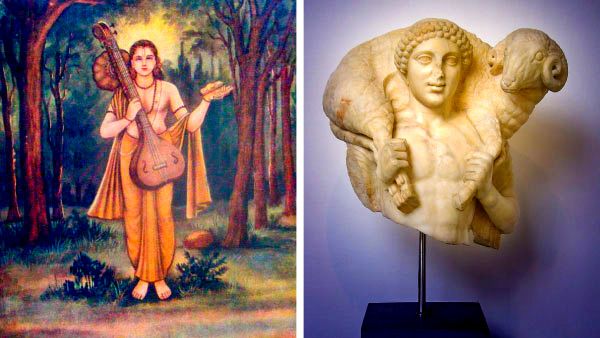
10. Similarities Between Narada and Hermes
Both of them are messengers of gods in Indian and Greek Mythology. Being cunning and scheming in their character, they share similar parentage as both were born to powerful gods. They were known to be tricking and misleading people with their verbal being tricky and misleading people with their usage of words.
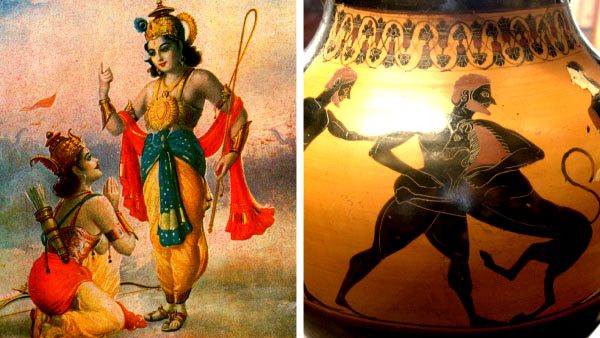
11. Similarities Between Krishna and Heracles
As per the Greek ambassador Megasthenes, Lord Krishna is thought to be similar to the demi God of Greeks, that is Heracles. The word Heracles comes from ‘Hari-kula-es' which means the clan of Hari. This connects to the clan of Krishna as Krishna is an avatar of Hari. The incident of Lord Krishna fighting with the serpent Kaliya can be likened to Heracles fighting the many headed serpent called Hydra.
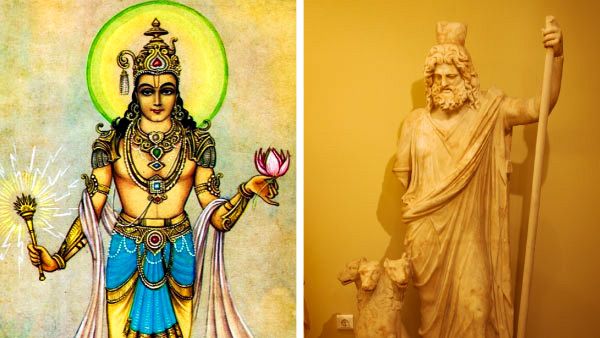
12. Similarities Between Indra and Zeus
There is a close resemblance between these two commanders in chiefs of the celestial army. They possessed the same weapon and live on mountains; Indra on Meru, and Zeus on Olympus. Both of them share similar personality traits.
Disclaimer: The information is based on assumptions and information available on the internet and the accuracy or reliability is not guaranteed. Boldsky does not confirm any inputs or information related to the article and our only purpose is to deliver information. Kindly consult the concerned expert before practising or implementing any information and assumption.
Image sources: Wikimedia Commons
-
 yoga spiritualityPancha Kedar Darshan in Sawan: A Spiritual Journey To The Five Sacred Temples of Lord Shiva in The Himalayas
yoga spiritualityPancha Kedar Darshan in Sawan: A Spiritual Journey To The Five Sacred Temples of Lord Shiva in The Himalayas -
 festivalsSaraswati Puja: 5 Offerings For Goddess Saraswati On Basant Panchami
festivalsSaraswati Puja: 5 Offerings For Goddess Saraswati On Basant Panchami -
 anecdotesWhy Urmila, Lakshman's Wife Slept Continuously For 14 Years
anecdotesWhy Urmila, Lakshman's Wife Slept Continuously For 14 Years -
 anecdotesWhen Ganesha Questioned The Prosperity Of Kubera – Read The Full Story
anecdotesWhen Ganesha Questioned The Prosperity Of Kubera – Read The Full Story -
 anecdotesWhy Is Lord Rama Known As Maryada Purushottam?
anecdotesWhy Is Lord Rama Known As Maryada Purushottam? -
 anecdotesThe Boy Born With A Gem On His Forehead
anecdotesThe Boy Born With A Gem On His Forehead -
 faith mysticismDo You Know What Many People Believe About The Changing Moon Phases?
faith mysticismDo You Know What Many People Believe About The Changing Moon Phases? -
 faith mysticismWho Was Lord Krishna? 8 Interesting And Lesser Known Facts About Him
faith mysticismWho Was Lord Krishna? 8 Interesting And Lesser Known Facts About Him -
 wellness9 Healthy Greek Foods To Improve Your Overall Health
wellness9 Healthy Greek Foods To Improve Your Overall Health -
 pulseSeven Wonders Of the Ancient World
pulseSeven Wonders Of the Ancient World -
 insyncPeter Andre's Cookbook For Single Parents!
insyncPeter Andre's Cookbook For Single Parents! -
 insyncRoyal Artifacts Belonging To Alexander The Great Found
insyncRoyal Artifacts Belonging To Alexander The Great Found


 Click it and Unblock the Notifications
Click it and Unblock the Notifications



